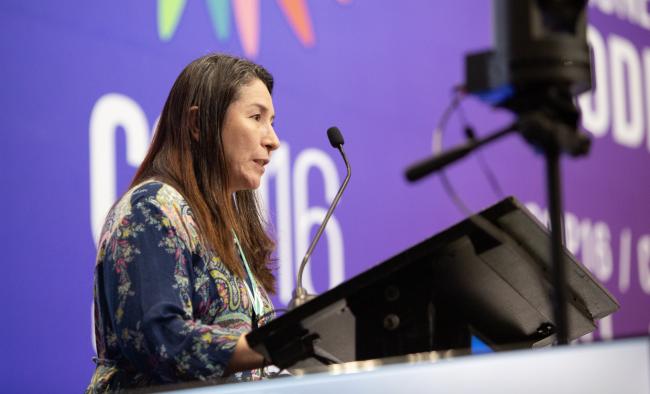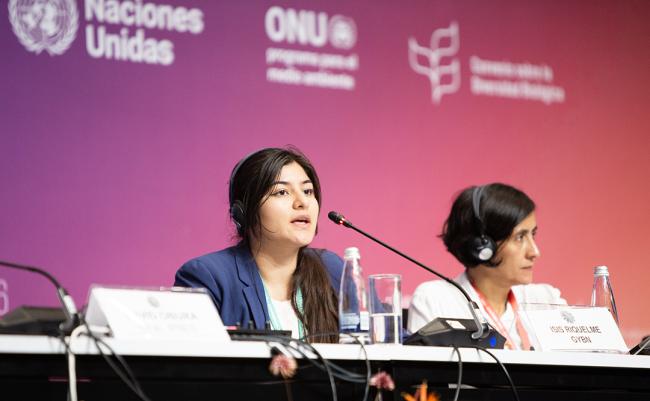About
The challenges of climate change, biodiversity loss, and unsustainable use of resources require synergies across global, national, and local levels. The scientific assessments provided by intergovernmental panels that address these issue can help only if they are transformed into actionable steps. This event invited speakers to exchange views on how scientific data can guide and be guided by environmental conservation.
Scientific assessments produced by the Intergovernmental Panel on Climate Change (IPCC) and the Intergovernmental Science-Policy Platform on Biodiversity and Ecosystem Services (IPBES) reports provide critical, policy-relevant information intended to inform policymakers at all levels who are seeking to address these interlinked crises. However, policymakers and practitioners need to take concrete steps to incorporate scientific findings into policy and decision making, as well as to coordinate efforts to address interrelated environmental challenges.
Ana María Hernández Salgar, COP16 Presidency and former IPBES Chair, moderated the event “Listening to the science: Using the findings of IPBES and IRP as a basis to build synergies between biodiversity, climate change and resource use.”
Underscoring that the current environmental crisis is a consequence of our development models, Susana Muhamad, Minister of Environment, Colombia, emphasized the importance of finding ways to help citizens understand both the crisis and the scale of action required. She further highlighted the importance of science and finding cross-cutting ways forward.
Emphasizing the importance of understanding the interaction between biodiversity and climate change, IPBES Chair David Obura presented the latest science from IPBES and the IPCC. He explained that climate change is a top driver of biodiversity decline, and conserving biodiversity supports mitigation of and adaptation to climate change. He added that many climate actions have negative impacts on biodiversity, particularly in the energy sector, and underscored the need for completely new thinking and integrative approaches to avoid harm to biodiversity.
Izabella Teixeira, International Resource Panel (IRP), focused on the importance of biomass, bioenergy, and bioeconomy, and possible steps that may be taken in restoring balance and environmental protection. She stated that resources are used at an alarming rate but are not included in sustainable development agendas. She highlighted the need for a circular economy, and for science to understand policy and society.
Braulio Ferreria, Ministry Environment and Climate Change, Brazil, reflected on whether there is still new information to be taken from various scientific reports. He noted that data shows that circumstances are more worrisome than initially forecasted, but, that on a regional level, there have been more positive results. As such, he said that it is important that information from sound science is actually translated in a manner that is understandable to the people so they can see the direct impact the climate situation has on their lives.
Scott Wilson, International Biodiversity Canada, shared his realizations while working on issues of biodiversity and climate change, stating that the impacts are clearly felt at the sub-national and local levels. He said concrete actions are needed and these stem from ensuring more accessible climate change and biodiversity data, including Indigenous and traditional knowledge. He also highlighted the importance of considering not just the interface between science and policy, but between science, policy, and practice.
Asami Segundo, Southeast Asia Coordinator, Indigenous and Community Conserved Areas (ICCA), put forward three tangible recommendations for climate change and biodiversity from the perspective of Indigenous Peoples: subnational and local harmonization of plans with the national and international levels; funding for the process of harmonization and to incentivize governments; and highlighting the role of conventions in pursuing harmonization plans.
Isis Riquelme, Global Youth Biodiversity Network, underscored that her generation is the first that has truly experienced the effects of climate change and biodiversity loss. She said that we are “dancing to the tune of the economic system,” emphasizing that this system is the source of our problems and where the greatest changes are needed. She underscored that young women in particular are directly affected by climate change but have negligible decision-making power. She called for “a brave man or woman” to lead and say we need to do something about our economic model.
In closing, Muhamad emphasized that the scientific reality is clear and both humans and nature are suffering. She lamented that we did not learn lessons from the COVID-19 pandemic about the connections between biodiversity and health and underscored the need for multilateral action and mobilization of territories. Highlighting that COP16 is the COP of the people and is focused on being at peace with nature, she said where synergies are clear and action is possible, hope can be reborn.
Contact: Paola Bernal Cortes, Ministry of Environment and Sustainable Development, Colombia
pbernal@minambiente.gov.co
For more information: https://www.cbd.int/side-events/5902
To receive free coverage of global environmental events delivered to your inbox, subscribe to the ENB Update newsletter.
All ENB photos are free to use with attribution. For the 2024 UN Biodiversity Conference, please use: Photo by IISD/ENB | Angeles Estrada Vigil

















